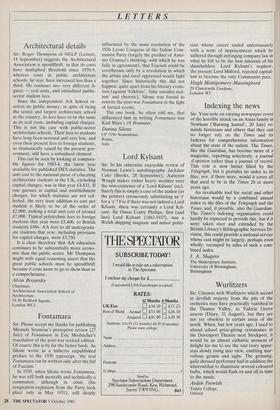Fontamara
Sir: Please accept my thanks for publishing Miranda Seymour's perceptive review (27 July) of Fontamara in Eric Mosbacher's translation of the post-war revised edition. Of course this is by far the better book. As Silone wrote in a hitherto unpublished preface to the 1930 typescript, 'the real Fontamara can he written only after the fall of Fascism.'
In 1930, when Silone wrote Fontamara, he was still both mentally and technically a communist, although in crisis (his resignation-explusion from the Party took place only in May 1931), still deeply influenced by the main resolution of the 1926 Lyons Congress of the Italian Com- munist Party (largely the product of Anto- nio Gramsci's thinking, with which he was fully in agreement), that Fascism could be overthrown only by a revolution in which the urban and rural oppressed would fight together. Since historically this did not happen, quite apart from his literary evolu- tion (against 'folklore', 'false socialist real- ism' and rhetoric), Silone was forced to rewrite the post-war Fontamara in the light of factual events.
The one book, he often told me, that influenced him in writing Fontamara was Karl Marx's 18 Brumaire.
Darina Silone
CP 7196 Nomentano, Rome, Italy


























































 Previous page
Previous page